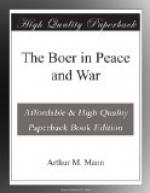Of course there are exceptions, and I remember one in particular. The instance I refer to occurred in a store. One of the gentlemen in question was leaning heavily against the counter, and one could observe at a glance that he, at least, had a good opinion of himself. Presently Boer number two entered. He was small in stature, like the other man, but there was a note of uncertainty about him which seemed to betoken that his opinion of himself did not measure up in proportion to that of the other Boer. Number two looked about him a bit, and occasionally directed a furtive glance at number one, who, on the other hand, stolidly regarded the array of goods spread out before him. Number two seemed to have settled the question in his own mind at last, for he approached the other party and held out his hand.
‘I am Britz,’ he said laconically, as the other touched the outstretched hand indifferently.
‘Ja!’ said number one; ‘I am Papenfus.’
The conversation ended here, and number two made a silent departure.
[Illustration: Waggons bringing wool to Early morning market (Johannesburg)]
The preliminary salutations of another pair of Boers are probably as interesting. It was during a prolonged drought, and both gentlemen had evidently experienced a difficulty in finding a sufficiency of water for the purposes of ablution. They had not met for a number of years, but the recognition was mutual.
‘Almachtig, Gert, you are still as ugly as ever!’
‘Ja!’ replied the other readily; ’and you are still alive with that face!’
The Boer is coarse in his conversation, although he prefers to regard it as wit. He likes to participate in a conversation bristling with this sort of wit, but when you come to tell him a really good thing, he fails entirely to grasp the point, and your joke falls flat, resulting usually in a painful silence.
He is also very chary of complications in the handling of money. He brings his wool into town once, and sometimes twice, a year, and that staple comprises the current coin of the country. His clip is weighed off in due course, and he proceeds to the store and sits down while the clerk figures up the amount. You may be foolish enough to ask him if he will buy a plough or a bag of coffee, but he continues to smoke hard and expectorate all over the floor without giving a definite reply. He wants to handle the money first, and then he will arrange about his purchases. Within half an hour he will probably have in his pocket two or three hundred golden sovereigns (he does not look upon bank-notes with favour; he wants something hard and substantial), and he will at once proceed to the matter of buying. At the end of the day his waggon is loaded up with a variety of household and agricultural necessities, for which he has paid, say, L150 of the money received for his wool. This is his way of doing things, and he thinks it is the right one.




